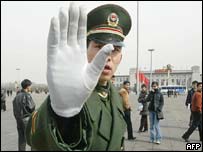BBC: China cracks down on dissent

Security is tight for the National People's Congress meeting |
Security operations in China have been stepped up as the annual National People's Congress continues in Beijing.
Activist Liu Xiaobo has been put under house arrest to prevent him from delivering an open letter to the congress meeting, protesting against the detention of a student internet activist, according to human rights groups.
A leading Chinese democracy campaigner, He Depu, is also said to have been charged with subversion this week.
Meanwhile, the government's efforts to screen content available on the internet appear to have led to a sharp slowdown in web access, according to industry experts.
Chinese dissidents have often tried to stage protests or letter writing campaigns during major parliamentary meetings.
This year's congress, which opened on Wednesday in Beijing's Great Hall of the People, is attracting even more attention than usual, as the delegates are expected to approve sweeping leadership changes with Vice-President Hu Jintao taking over the presidency from Jiang Zemin.
New York-based Human Rights In China (HRIC) said on Friday that the announcement of charges against He Depu stemmed from official fears of dissident activity while the congress was taking place.
Mr He has been detained in police custody since November, after signing a petition urging the ruling Communist Party to implement greater democracy.
Liu Xiaobo's house arrest is a result of his plans to deliver a letter to congress urging a fair trial for Liu Di, a 22-year-old student at Beijing Normal University who was detained in November after she posted politically sensitive articles on the internet, the US-based China Labor Watch said.
Liu Di's arrest has become a popular topic in Chinese internet chatrooms, with thousands of messages expressing sympathy with the student, who used the internet name "stainless steel mouse".
[...]
The slowdown in internet access comes as censors seek to ban content which they deem to be subversive, including some human rights information and details of the outlawed Falun Gong spiritual movement.
Beijing has built an online barrier around China, requiring inbound and outbound traffic to pass through just eight gateways.
The result is a huge bottleneck, and a much slower service, especially at sensitive times.
http://news.bbc.co.uk/1/hi/world/asia-pacific/2828433.stm